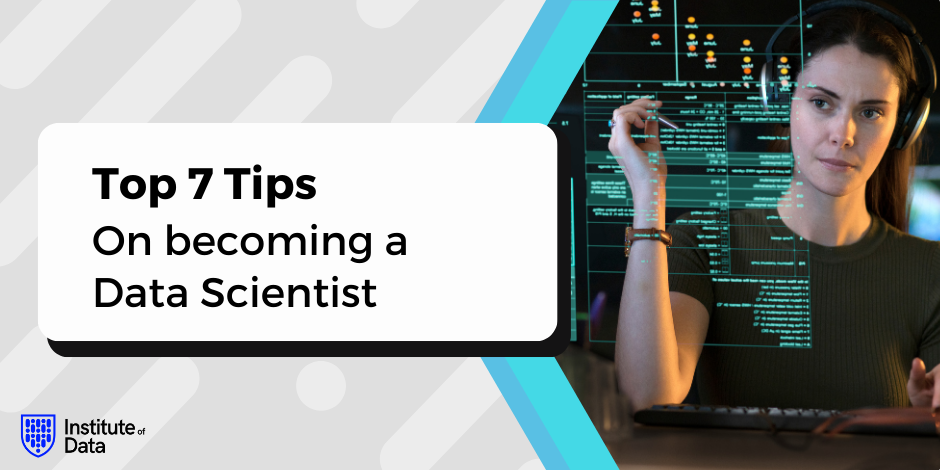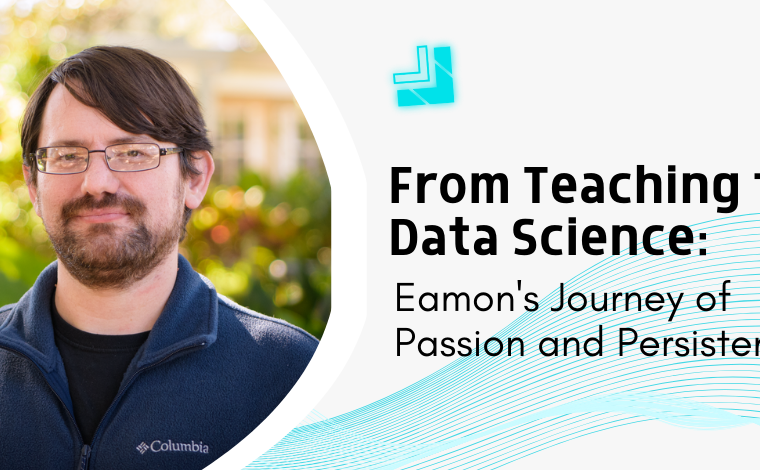Top 7 Tips on Becoming a Data Scientist

Stay Informed With Our Weekly Newsletter
Receive crucial updates on the ever-evolving landscape of technology and innovation.
The world of data science is vast and ever-evolving, offering a plethora of opportunities for those who want to explore it.
The global Data Science Platform market size reached USD 45,941.83 million in 2021 and is projected to expand at a compound annual growth rate (CAGR) of 16.29% by 2027.
If you’re considering a career in this exciting field, here are the top 7 tips on becoming a data scientist.
1. Understand the role of a data scientist

Before embarking on your journey to becoming a data scientist, it’s crucial to understand what the role entails.
Data scientists are responsible for interpreting and analysing complex data, providing insights that help organisations make strategic decisions.
They use a variety of techniques, including machine learning and predictive modelling, to extract meaningful information from raw data.
This requires a strong foundation in mathematics and statistics, as well as proficiency in programming languages such as Python and R.
2. Know the key skills required
On the journey to becoming a data scientist, you’ll need a broad set of skills.
These range from technical abilities, such as data analysis and machine learning, to soft skills like problem-solving and communication. A keen eye for detail and a natural curiosity are also essential.
Another crucial skill is the ability to present complex data clearly and understandably.
This involves creating visualisations and reports that non-technical stakeholders can easily interpret.
3. Gain necessary education for becoming a data scientist
While there are many paths to becoming a data scientist, most professionals hold at least a bachelor’s degree in a related field, such as computer science, mathematics or statistics.
A master’s degree or PhD can further enhance your prospects.
However, formal education is just one piece of becoming a data scientist.
Practical experience is equally important, and many data scientists start their careers in related roles, such as data analyst or statistician, before progressing to more advanced positions.
Online courses and certifications
In addition to traditional education, numerous online courses and certifications can help you acquire the skills needed when becoming a data scientist.
These range from introductory courses on data science and machine learning to more advanced topics like deep learning and artificial intelligence.
Many of these courses are offered by prestigious universities and organisations, and some even provide certification upon completion.
Excellent online programmes, like the Data Science and AI programme offered by the Institute of Data, can teach you the necessary skills and provide real-world project experience.
This can be a valuable addition to your CV, demonstrating your commitment to learning and staying up-to-date with the latest developments in the field.
4. Get practical experience

As with any profession, practical experience is key to becoming a data scientist. This can be gained through internships, entry-level positions, or even personal projects.
Working on real-world data problems will not only help you apply what you’ve learned but also give you a taste of what it’s like to work as a data scientist.
It’s also a great way to build a portfolio that showcases your skills and abilities.
Participating in data science competitions
Another excellent way to gain practical experience is by participating in data science competitions.
These events, such as those hosted by Kaggle, provide an opportunity to work on challenging problems, learn from other data scientists, and even win prizes.
Competitions can also help you build a network within the data science community, which can be invaluable when it comes to finding job opportunities.
5. Master the tools of the trade
There are many tools and technologies used in data science, and becoming proficient in these is crucial.
This includes programming languages like Python and R, as well as software for data analysis and visualisation, such as Tableau and PowerBI.
It’s also important to familiarise yourself with big data platforms like Hadoop and Spark and machine learning libraries such as TensorFlow and Scikit-learn.
Staying up-to-date with the latest trends
Data science is a rapidly evolving field, and it’s important to stay up-to-date with the latest trends and developments.
This includes new tools and technologies, as well as advancements in machine learning and artificial intelligence.
Reading industry blogs, attending webinars and conferences, and participating in online forums can all help you stay current in the data science world.
6. Build a strong network
Networking is an often overlooked aspect of becoming a data scientist, but it’s incredibly important.
Building a strong network can open up new opportunities, provide valuable insights, and even lead to job offers.
There are many ways to network in the data science community, from attending industry events and meetups to participating in online forums and social media groups.
Mentorship and collaboration
Having a mentor can be invaluable in your journey to becoming a data scientist. A mentor can provide guidance, share their experiences, and help you navigate the challenges of the field.
Collaborating with others, whether it’s on a project or through a study group, can also be a great way to learn and grow.
It allows you to gain different perspectives, learn new techniques, and improve your teamwork skills.
7. Continue professional development

Finally, becoming a data scientist is not a one-time achievement but a continuous journey of learning and development.
The field is constantly evolving, and it’s important to stay ahead of the curve by continually updating your skills and knowledge.
Whether it’s through formal education, online courses, or self-study, make sure to invest in your professional development.
This not only enhances your capabilities as a data scientist, but also increases your value to employers.
Conclusion
Becoming a data scientist is a rewarding but challenging journey.
It requires a combination of education, practical experience, and a deep understanding of the tools and techniques used in the field.
However, with dedication, perseverance, and the right approach, you can successfully navigate your way to a fulfilling career in data science.
Remember, the journey of becoming a data scientist is not a sprint but a marathon. Keep learning, stay curious, and never stop exploring the fascinating world of data science.
Want to learn more about data science? Download a copy of the Institute of Data’s comprehensive Data Science & AI programme outline for free.
Alternatively, we invite you to schedule a complimentary career consultation with a member of our team to discuss the programme in more detail.




